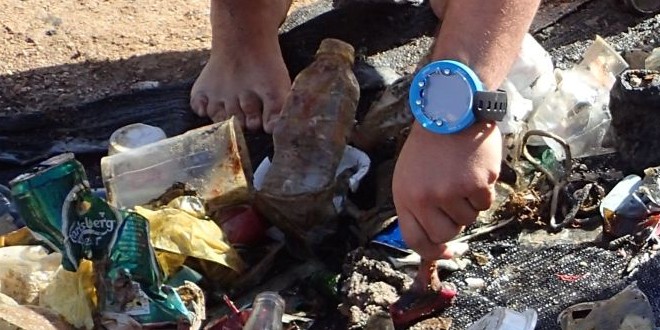Plastic pollution, which is all man-made, poses a grave and immediate danger to the marine environment, with constantly rising amounts of the stuff entering the oceans. A major cause for the difficulty in coping with the threat is that marine plastic lacks global standardization to promote research and prevent its spread, according to a new review by Tel Aviv University (TAU) scientists.
The word “plastic” originates from the ancient Greek plastikos, meaning shapeable, moldable. This trait has significantly contributed to its popularity and rapid global increase in use in recent decades, while also presenting immense challenges for its detection, identification, and quantification in marine ecosystems.
“Marine plastic is highly complex and varied, and consequently, many different methods are used for monitoring these pollutants. To enhance research and focus prevention efforts, global standardization must be established,” urged Gal Vered and Prof. Noa Shenkar of TAU’s School of Zoology at the George Wise Faculty of Life Sciences and The Steinhardt Museum of Natural History. Vered is also a researcher at the Interuniversity Institute for Marine Sciences in Eilat.
Their review has just been published in Current Opinion in Toxicology under the title “Monitoring plastic pollution in the oceans.”
Plastic pollution is extremely harmful to marine life, they wrote. “Organisms swallow particles, and toxins and become entangled in larger products and nets.’
In the comprehensive survey of all methods described in existing literature, the researchers charted the great complexity and diversity of marine plastic pollution, which makes unified measurement and accurate evaluation very difficult. According to the researchers, this is precisely why a standardized system is urgently needed, enabling comparisons, exchange of information and effective tools for decisionmakers.
A 2013 survey conducted by Israel’s Environmental Protection Ministry, said Shenkar, found that plastic accounts for about 41% of the volume of waste produced annually by Israelis. The Covid-19 pandemic, which has generated extreme demands for personal protective and single-use products including masks that contain plastic, has further worsened the problem.
Plastic wastes endanger marine life in many ways. Animals get entangled in large plastic objects or swallow small particles and chemicals, consequently dying of suffocation, starvation or poisoning,” explained Shenkar. “Awareness is growing, and research is expanding, but the effort to monitor and prevent plastic pollution encounters many obstacles, first of all due to the enormous complexity and diversity of plastic debris.”
The researchers noted that marine plastic pollution consists of many different types of plastic and plastic products of various shapes and sizes – from huge ghost nets to nanoparticles, as well as a vast range of chemical additives. Different methods for monitoring, sampling and identifying plastic pollution relate to different properties of the sampled material: from size, source and original use, through shape and color, to chemical composition and physical properties.
Sampling is usually conducted with a towed net, with the size of collected pollutants dependent on the net’s mesh size, and tiny particles are identified in the lab using various spectroscopic and chemical methods. In addition to the diversity in sampling and identification methods, units used for reporting measured concentrations of pollutants also vary – from the number of plastic objects per area to the weight of particles per organism, and more.
“These differences generate confusion and lack of communication among researchers in different parts of the world, hampering our efforts to work together toward our common goal: providing decision makers with reliable data in order to promote the efforts to reduce plastic pollution and its many hazards. We are in urgent need of standardized methods and comparable measures for monitoring, sampling, identifying, classifying, and quantifying marine plastic pollution and its impact,” said Shenkar.
“This study is a response to problems encountered in my research, which deals with the impact of plastic and its chemical additives on marine life in the Eilat coral reef [presenting Israel’s largest marine biodiversity],’ said Vered. “The differences in methodology make it difficult to use the findings of other researchers – as either a source of information or for comparing results. So for example, most measurements worldwide relate to samples obtained with a towed net from the surface of the water, while I wish to discover which materials reach the seafloor and reef organisms.”
Standardization will enable accurate evaluations and valid comparisons between plastic pollutions in different places on the globe, said the researchers. “This will maximize the power of scientific research, enhance our understanding of the impact of plastic pollution on ecosystems and marine life, and help us develop effective tools for decision makers facing this crucial issue.”
Shenkar concluded that “marine plastic pollution is a global problem that requires extensive international collaboration. At the bottom line we all wish to focus our efforts and obtain the best results. Like many others, we believe that efforts should begin close to the shoreline, in areas directly impacted by plastic pollution. However, a great deal of research is still required in order to establish this assumption and build effective strategies for managing plastic pollution. But first of all, we urgently need standardization that will enable all of us, all over the world, to work together.”
The shortcode is missing a valid Donation Form ID attribute.



